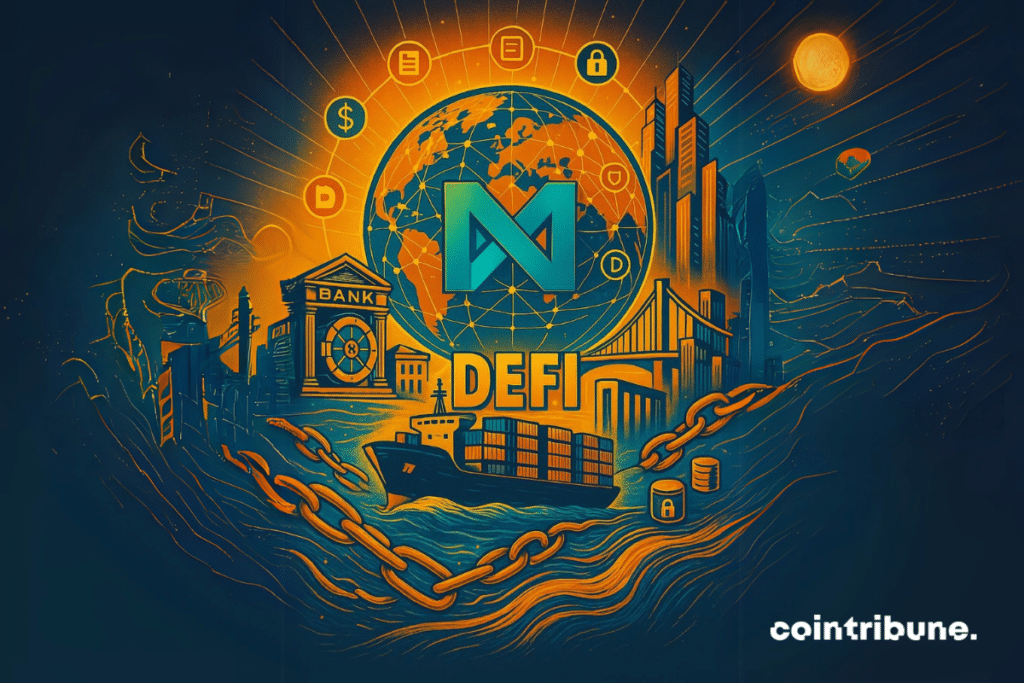The maritime industry, a pillar of global trade, has long been confronted with outdated financial systems. Companies must manage inefficiencies, slow processes, and fraud risks, complicated by the complexity of cross-border transactions and compliance with multi-jurisdictional regulations. These challenges limit access to capital, delay transactions, and result in an overall lack of financial transparency. With traditional institutions hesitant to engage, the industry faces significant gaps in financial solutions.


Blockchain technology offers a revolutionary solution to the financial challenges of the maritime sector. Its decentralized, transparent, and secure nature overcomes inefficiencies and enhances trust. By leveraging blockchain, companies can streamline their financial operations, accelerate transactions, reduce fraud risks, and improve compliance with global regulations.
A company at the forefront of this revolution is Nexum, a blockchain-based platform designed to modernize maritime financing. By integrating innovative technology with the specific needs of the sector, it is redefining how companies approach cross-border payments, lending, and risk management.
A blockchain solution for lending
Access to working capital is essential to maritime operations, such as vessel maintenance and bunker fuel purchases. Traditional lending processes, burdened by paperwork and manual checks, often cause costly delays for businesses. Nexum’s blockchain-powered lending platform simplifies this process by automating approvals and securely recording transactions on an immutable ledger. This ensures transparency while enabling companies to access funds quickly and efficiently.
Using blockchain eliminates many inefficiencies of traditional systems, allowing maritime businesses to focus on their operations rather than complex financial procedures. By integrating real-time data, the platform improves credit decision-making, ensuring a smooth experience for both lenders and borrowers.
Combatting fraud and risk management
Fraud is a major problem in maritime financing, especially for cross-border transactions, which are often subject to manipulation. Traditional financial systems often lack transparency, complicating the detection and prevention of fraudulent activities. Nexum’s blockchain solution addresses this issue by making all financial records tamper-proof and easily verifiable.
With real-time tracking and dynamic risk assessments, the platform enables companies and lenders to make informed decisions. By reducing fraud risks and enhancing trust, this solution helps create a safer financial ecosystem for the maritime industry.
Cross-border transactions in the maritime sector are often complex, involving multiple currencies and regulations. Nexum’s platform integrates both fiat and stablecoin payments, ensuring smooth operations regardless of the legal framework.
This innovation simplifies payment processes, reduces transaction costs, and eliminates delays due to currency conversions. By bridging traditional and decentralized financial systems, this blockchain solution allows companies to operate more efficiently in a globalized economy.
The Nexum Hub: privacy and compliance
Data protection is a major concern for the maritime industry, especially with regulations such as GDPR requiring companies to safeguard personal information. Sensitive data, such as Know Your Customer (KYC) documents, is often stored in centralized systems, making them vulnerable to security breaches.
Nexum addresses this challenge with its Nexum Hub, a patented solution that decentralizes the storage of sensitive transactional data. Using a distributed system like the InterPlanetary File System (IPFS) and advanced encryption techniques, this Hub ensures personal data is never stored in a single location, thereby reducing breach risk and ensuring compliance with regulations like GDPR. This decentralized approach also facilitates audits, improving transparency and accountability.
Focus on bunker fuel and cross-border payments
The bunker fuel market, valued at 150 billion dollars, is a key component of maritime trade but has long been underserved by traditional financial institutions. Multi-jurisdictional transactions and complex payment processes have created barriers to efficient capital allocation.
Nexum’s blockchain solution aims to solve these issues by offering faster financing access and optimized payment systems for bunker fuel traders. By integrating real-time financial data and blockchain technology, it ensures transparency, reduces costs, and simplifies operations. This transformation has the potential to revolutionize how traders in this sector conduct their business.
A transition towards decentralized finance in maritime
Although the company initially focuses on maritime financing, blockchain’s potential goes far beyond this sector. By reducing inefficiencies, enhancing security, and fostering trust, blockchain paves the way for other industries such as logistics, insurance, and healthcare to adopt decentralized financial solutions.
The platform’s success in maritime financing illustrates blockchain’s versatility in solving complex economic challenges. As other industries recognize its benefits, blockchain adoption is expected to grow, driving innovation in global markets.
A new era for maritime trade
Blockchain is much more than just a financial modernization tool: it is a catalyst for transformation across the entire sector. By bridging the gap between traditional finance and decentralized systems, this unique solution creates a secure, efficient, and transparent ecosystem for maritime businesses. This evolution marks a turning point not only for the maritime industry but also for global finance.
Opening the way to the future
Nexum’s blockchain solutions pave the way for a more promising future in maritime financing. By addressing persistent challenges such as slow capital access, fraud risks, and data protection, they establish a new standard for financial operations. As the maritime industry adopts these changes, it opens the door to broader innovation across global trade.
Maximize your Cointribune experience with our “Read to Earn” program! For every article you read, earn points and access exclusive rewards. Sign up now and start earning benefits.
The Cointribune editorial team unites its voices to address topics related to cryptocurrencies, investment, the metaverse, and NFTs, while striving to answer your questions as best as possible.
Disclaimer:
The contents and products mentioned on this page are in no way approved by Cointribune and should not be interpreted as falling under its responsibility.
Cointribune strives to communicate all useful information to readers, but cannot guarantee its accuracy and completeness. We invite readers to do their research before taking any action related to the company and to take full responsibility for their decisions. This article should not be considered as investment advice, an offer, or an invitation to purchase any products or services.
Investment in digital financial assets carries risks.
Read more

